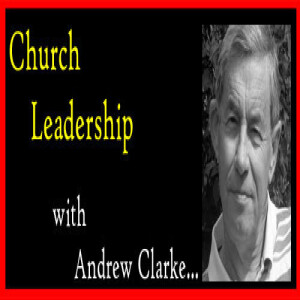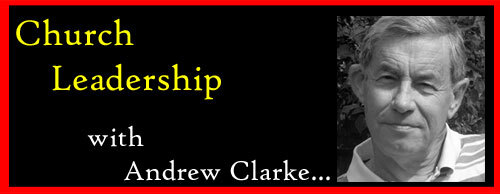
432.4K
Downloads
3357
Episodes
G’day and welcome to Partakers Christian Podcasts! Join us for uplifting Bible teaching, inspiring readings, heartfelt worship, powerful prayers, and fascinating church history. Whether you’re new to faith or growing deeper in your journey, we’re here to encourage and equip you. 🎧 Tune in, interact, and be inspired—wherever you are in the world.
G’day and welcome to Partakers Christian Podcasts! Join us for uplifting Bible teaching, inspiring readings, heartfelt worship, powerful prayers, and fascinating church history. Whether you’re new to faith or growing deeper in your journey, we’re here to encourage and equip you. 🎧 Tune in, interact, and be inspired—wherever you are in the world.
Episodes

Thursday Sep 12, 2024
Church Leadership 02 - Understanding the jargon
Thursday Sep 12, 2024
Thursday Sep 12, 2024

Church Leadership
Session 2: What does it mean? Understanding the jargon
Welcome to the second of these podcasts on church leadership. Last time we asked the question: “Who is in charge?” The answer, of course, being that Jesus is the Head of the church – and therefore the Boss. In this session we are going to consider some of the terms that are used when talking about church and church leadership and attempt to be clear on what we mean as we go through this series.
Let’s start with the word “church”. We get our word “church” from the Greek "ecclesia" which literally means "assembly", "congregation", or the place where such a gathering occurs. Over the years, “church” has come to signify both a specific edifice of Christian worship (a "church"), and the overall community of the faithful (the "Church").
According to the New Testament, the earliest Christians did not build church buildings. Instead, they gathered in homes (Acts 17:5, 20:20, 1 Corinthians 16:19) or in Jewish worship places like the Temple in Jerusalem or synagogues (Acts 2:46, 19:8) – or in hired premises. It wasn’t until the 11th and 12th centuries that church buildings were erected and used for public worship and meetings of the church.
The proper use of the word “church” is when describing the body of believers who have been born again of the Spirit of God and accept Jesus as their Saviour and Lord. We see this expressed locally, nationally and internationally as all believers are part of the one Church.
Some “flavours” of the church retain a local leadership (with perhaps some affiliation to a national body), some have a more hierarchical structure both nationally and internationally. When we look at some aspects of leadership, we will attempt to make it clear what style of leadership we are talking about. So – church is the people, not buildings.
Now we come to terms commonly used for leadership roles in churches:
Some churches have bishops, priests and deacons – and all these terms are used in the New Testament. Other churches have other titles for their ministers – such as apostle, elder and pastor – and these terms also occur in the New Testament. Other terms within the hierarchy of some churches – such as dean, canon, cardinal and pope – have no Scriptural basis – and various words are used to describe the typical role of priest – such as rector, vicar etc.
Incidentally, the word ”minister” simply means servant – so it is a legitimate term to use for anyone serving the church of God in whatever capacity. I was stuck in traffic on the South Circular Road in London some years ago and saw a church noticeboard which said – among other things – “Ministers: The whole congregation”. I like that.
First of all – bishops: – the Greek word can also be properly translated ‘overseers’, ‘superintendents’ or ‘elders’. At one church where I was an Elder, one of the elderly gentlemen there used to greet me with “Good morning, Bishop” – and while it sounded strange in the Pentecostal church that we were – he was right. They feature always as a group within a given church – there is no single ‘bishop’ or ‘elder’ that holds office on their own.
‘Deacons’ are distinct from elders, and again spoken of as a group consisting of local people. Their name – ‘deacon’ means ‘server’ – suggests that their function was more practical – perhaps along the lines first explored in Acts 6. We shall use Stephen, one that early group, as an example when we look in more detail at this role.
Now let’s have look at ‘priests’. In Paul’s letters to Timothy and Titus (the Pastoral Epistles) the word never occurs – Hebrews is the book where it is most frequently used in the New Testament. It refers first of all to the priests of the old covenant whose role was to offer sacrifice in the tabernacle/temple. But the preacher to the Hebrews argues that the role is now finished and there is no more place for animal sacrifice or for the priests who offer it. Instead there is Jesus as the Great High Priest and all believers have access to God through Christ’s single sacrifice. The idea of a priesthood that holds office in the church is not one held forth in the New Testament – all believers have a priestly ministry (that is: speaking to God for the people). The Greek word for ‘elder’ is presbyteros from which we get our English word ‘priest’. So, as time went on, a threefold pattern of bishop, priest and deacon became the standard form.
Peter, when talking to “the shepherds of God’s flock” (1 Peter 5:1 & 2) – from where we get our title of pastor – addresses them as ‘elders’. So pastors are simply “shepherds” and lead God’s people with an emphasis on the more gentle and caring aspect of “eldering”. Incidentally, Peter here describes himself as a “fellow elder” – and he was the recognised leader of the Christian Church at that time.
The basic meaning of apostle (apostolos) is simply that of one sent on a mission. In its primary and most technical sense apostle is used in the New Testament only of the twelve, including Matthias, who replaced Judas (Acts 1:26), and of Paul, who was uniquely set apart as apostle to the Gentiles The term apostle is used in a more general sense of other men in the early church, such as Barnabas (Acts 14:4), Silas and Timothy (1 Thess. 2:6), and a few other outstanding leaders (Rom. 16:7; 2 Cor. 8:23; Phil. 2:25).
We must be careful not to import our own understanding of these ‘ministry’ words back into them. We must recognise that both the words we use - and the nature of the offices they denote - have been through a long process of development. These letters were written to churches in the early stages of that development – and we must read them with a due awareness of the distance between those early days and the structures we find in most churches today.
We will look in more detail at these roles in future podcasts.
A prayer: Father, thank you for the church that I am part of – and thank You for those who lead us. May they know Your blessing as they follow You. Amen
Next week we will asking the question: “What does both the Old and New Testaments teach us about leadership?” Thank you and God bless you!

No comments yet. Be the first to say something!